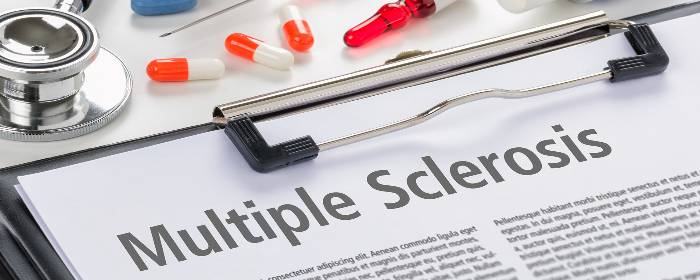
by admin | Mar 8, 2019 | Mesenchymal Stem Cells, Multiple Sclerosis, Stem Cell Research, Stem Cell Therapy
Of all conditions that affect the central nervous system, Multiple Sclerosis (MS) is the most common in young adults. The severity of multiple sclerosis varies considerably and can affect almost every organ system in the body affecting eyesight, bowel function, bladder function, and sexual function. Multiple sclerosis may cause cognitive problems, depression, seizures, fatigue, and pain. Most people with multiple sclerosis will have a relapsing-remitting course, which means they will have periods of relative health punctuated by flare-ups of the condition. About one out of ten people with the condition will have primary progressive multiple sclerosis, which means once the disease occurs it almost constantly causes symptoms and progresses over time.
Multiple sclerosis appears to be an inflammatory condition that affects the covering around nerves. During acute flareups/exacerbations, physicians usually prescribe a powerful steroid medication such as methylprednisolone to combat the inflammation. Patients with multiple sclerosis generally always require some sort of treatment to help manage their immune system. No fewer than 15 immune modulating treatments have been used to treat multiple sclerosis, none of which provides a cure. As such, researchers are seeking new and innovative ways to treat this potentially debilitating condition.
Researchers at the Tisch Multiple Sclerosis Research Center of New York chose to focus their research efforts on a particular type of stem cell, namely bone marrow-derived mesenchymal stromal cells. The researchers harvested these cells from the patients themselves (autologous stem cells). Then, in their laboratory, scientists used various means to prompt the cells to become neural progenitors. A neural progenitor cell is a cell that can become any of the three main types of brain cells: neurons, astrocytes, or oligodendrocytes. Incidentally, oligodendrocytes are believed to be most affected in multiple sclerosis.
Harris and co-authors at the Tisch Center enrolled six patients with progressive multiple sclerosis. These six patients had failed to find relief from other conventional multiple sclerosis treatments. The researchers provided between 2 to 5 infusions of neural progenitor cells into the spinal fluid. The multiple sclerosis patients treated with the cells tolerated the treatment very well. No serious adverse events occurred, nor were there any safety concerns during treatment. Impressively, four of the six patients—for whom no other multiple sclerosis treatment worked—had a measurable clinical improvement after stem cell treatment.
Based on the results of this clinical study, the scientists concluded that neural progenitor cells created from autologous mesenchymal stromal cells were safe to use in patients with primary progressive multiple sclerosis. Moreover, the beneficial effect witnessed in two-thirds of treated patients suggests that these cells may be able to help patients with even the most severe and difficult-to-treat forms of multiple sclerosis. Of course, additional testing is required before this treatment becomes commonplace, but the results of this first-in-human clinical study are extremely encouraging.
Reference: Harris et al. (2016). Clinical safety of intrathecal administration of mesenchymal stromal cell-derived neural progenitors in multiple sclerosis. Cytotherapy. 2016 Dec;18(12):1476-1482.

by admin | Feb 26, 2019 | Cannabinoid, Multiple Sclerosis, Pain Management
Multiple sclerosis (MS) is a debilitating neurological condition. MS causes nerve cells to become dysfunctional. The symptoms of multiple sclerosis vary from person to person and over time; however, one of the most common symptoms of MS is muscle spasticity. More than 80% of patients with MS have some degree of muscle spasticity.
Muscle spasticity causes increased muscle tone. Affected muscles contract even though the person is not trying to contract them. Patients may also experience uncontrollable muscle jerking and spasms. These muscle contractions can be quite painful and interfere with daily activities. In fact, about one in 20 multiple sclerosis patients with muscle spasticity are completely disabled because of it.
It can be difficult to treat muscle spasticity in patients with multiple sclerosis. Physicians may prescribe baclofen, tizanidine, or dantrolene for muscle spasticity; however, these treatments are only mildly effective and may cause troubling or serious side effects. Baclofen may cause muscle weakness, tizanidine may cause severe dry mouth, and dantrolene is toxic to the liver, for example. Researchers are continuously looking for ways to help multiple sclerosis patients to reduce muscle spasticity.
Cannabinoids are the biologically active chemicals found in the cannabis plant. Cannabinoids have been used successfully for various medical purposes. For example, these agents have been used to treat nausea caused by chemotherapy and to stimulate appetite in patients with cancer. Patients with multiple sclerosis have reported that hemp extract helps relieve symptoms. Moreover, research studies have shown cannabinoids can protect nerve cells against damage. Based on these findings, researchers conducted a clinical trial to study the effect of cannabinoids on muscle spasticity in patients with multiple sclerosis.
A total of 630 patients with multiple sclerosis and muscle spasticity received the hemp extract or placebo for 15 weeks. The researchers then performed a number of objective tests to assess muscle spasticity. Patients who received the cannabinoids had fewer symptoms and less muscle spasticity at the end of the clinical trial compared to patients taking the placebo. The greatest benefit appeared after 40 weeks of treatment. Indeed, patients felt that cannabinoids helped manage their condition. Importantly, no major safety concerns were reported.
These clinical trial results suggest long term cannabinoids treatment is safe and may help people with Multiple Sclerosis control symptoms of muscle spasticity.
Visit our website for available hemp extract products. Click here
Reference: Zajicek et al. (2005). Cannabinoids in multiple sclerosis (CAMS) study: safety and efficacy data for 12 months follow up.Journal of Neurology, Neurosurgery, and Psychiatry. 2005 Dec;76(12):1664-9.

by admin | Jan 10, 2019 | Health Awareness, Multiple Sclerosis
The complex interplay between nutrition and health is still being researched by experts. In many cases, there are already established links between certain foods and undesirable health outcomes. For example, recent dietary guidelines recommend limiting added sugars to 10% of your daily calories or less, as they’re associated with an increased risk of heart disease. For individuals with chronic diseases, it’s perhaps even more important to consider the ways food can impact health.
For those with Multiple Sclerosis (MS),
optimizing your diet means not only filling your plate with healthy foods, but
also avoiding or limiting foods known to exacerbate symptoms. Research shows
that in particular, patients with MS have been able to improve their quality of
life by making specific tweaks
to their diet. Discover which foods
you should discuss with your doctor as a means of controlling your symptoms.
Fats
Saturated fats are commonly found in animal products,
including red meat. These foods aren’t entirely void of nutritious qualities –
after all, they can be rich sources of protein. Yet, their high concentration
of saturated fats presents issues, as they could raise “bad” cholesterol
levels. This is especially of concern for MS patients, who face a higher risk
for heart problems than people without MS.
Trans fats, too, are considered dangerous. Sometimes labeled
as “partially hydrogenated oils,” these fats are known to increase
inflammation, particularly within the blood vessels. This, too, increases the
risk of cardiovascular issues. Steer clear of packaged cookies, crackers, and dessert
items, or at the very least, be sure to enjoy them sparingly.
Sugar
We mentioned briefly above that added sugars are notorious
for their adverse health effects. Not only does excess
sugar lead to weight gain, but it also produces an inflammatory effect
which can intensify MS symptoms. Natural sugars, including those found in
fruits, don’t have the same effect, so feel free to snack on those instead.
Sodium
Added salt presents a number of issues for MS patients. In
general, higher sodium intake is associated with increased
disease activity in MS, and has been found to increase likelihood of
relapse and development of lesions. Sodium intake and blood pressure are also
related, and because high blood pressure can decrease life expectancy in MS
patients, added salt should be consumed at a minimum.
Dairy
Like meat, cow’s milk and other full-fat dairy products are high
in saturated fats. Besides the fat content, however, specific proteins in the
milk could cause trouble for people with MS. These agents could produce a
reaction in multiple sclerosis sufferers, but research shows
the link isn’t very strong. However, it may be worth replacing cow’s milk and
other full-fat dairy products with alternatives to see if it alleviates your
symptoms. Consider exploring options such as soy, almond, or even camel’s
milk.
Gluten
Gluten is primarily a concern for people with celiac
disease, which is characterized by an allergy to the protein found in rye,
wheat, and barley. Consuming gluten can cause intestinal damage in people with
the allergy. Because MS patients have a higher incidence
of celiac disease than the general population, it may be useful to closely
monitor your body’s reaction to consuming bread, cereal, pasta, and other foods
with gluten. While there is currently no evidence suggesting avoidance of
gluten can alleviate MS symptoms in patients who don’t have celiac disease, it never
hurts to bring up any food-related concerns you may have with your physician.

by admin | Dec 19, 2018 | Health Awareness, Multiple Sclerosis
Multiple sclerosis (MS) is a chronic condition in which the body’s immune system directs itself against the central nervous system (CNS). Most often, this impacts the brain, spinal cord, and optic nerves. The symptoms of this condition can vary widely, with some people experience mild effects and others struggling to complete daily tasks.
Frustratingly, many of the symptoms of MS aren’t outwardly visible. These behind-the-scenes challenges are therefore often endured silently, while the patient’s friends and family members may assume that their appearance of health indicates minimal to no suffering. Here are some of the symptoms which, despite their invisibility, can be debilitating; along with practical coping mechanisms to help you maintain your quality of life.
Pain
Up to two-thirds of people with MS report pain. For many, it interferes with aspects of daily life, including career, recreation, mood, and their ability to complete activities. The steady discomfort is suspected to result from fatigued muscles, which are working to compensate for those weakened by the disease. Sometimes, chronic pain is reported to feel like a tight band around the chest or torso, known as the “MS hug.” It may also feel like burning, prickling, aching, or “pins and needles.”
Sharp pains, on the other hand, are believed to be from faulty nerve signals caused by the lesions produced by MS in the CNS. The damage to the nerves is called dysesthesia and can impact the legs, feet, arms, and trunk. Up to 55% of people with MS have experienced this “clinically significant pain,” and while it isn’t necessarily dangerous, it can be a source of significant frustration.
For some people, compression stockings or gloves can minimize the pain caused by dysesthesias. For others, pain is more pronounced and requires the use of medications. Doctors may prescribe anticonvulsant medications or antidepressants, which change the ways in which the CNS reacts to pain. Over-the-counter pain relievers, including acetaminophen, and warm compresses can also be used to combat pain under a doctor’s supervision.
In many cases, chronic pain is best addressed through anti-inflammatory drugs, either over-the-counter or prescription. Stretching routines may also aid in maintaining flexibility in the muscles, which could help with pain levels. Massage therapy and physical therapy may also be beneficial. Some seeking an alternative option will consider stem cell therapy due to the potential regenerative ability these stem cells offer for those with MS.
Ultimately, discomfort for MS patients varies in intensity. On days when pain is most severe, changing your routine may provide the greatest relief. Whether it’s declining a social event or using a mobility-assistive device, it’s important to find ways to put your comfort first when experiencing intense pain.
Fatigue
The fatigue MS patients experience goes beyond general tiredness: it is often described as a flu-like feeling of exhaustion or extreme muscle weakness. It occurs in 80% of people with the condition and is therefore among its most common symptoms. Although the condition itself can be the cause, it’s also possibly related conditions, such as sleep disorders, medications, and depression could be culprits behind fatigue.
To determine the best form of treatment for your fatigue, consult with your doctor to pinpoint the reason for your exhaustion. If it’s the condition itself, lifestyle management tactics developed through occupational and physical therapy could make day-to-day tasks more manageable. Scheduling rests and even short naps could help you conserve energy. Also, while it might seem counterintuitive, light physical activity might actually combat energy depletion.
For sleep-related issues, stress management, relaxation training, and sleep regulation techniques may be beneficial. If your fatigue comes on suddenly, occurs regularly, and begins to interfere with responsibilities, consider talking to your doctor about medication options.
Cognitive Issues
Cognitive impairment, including issues with memory, perception, learning, and problem-solving, is reported by nearly 50% of people with MS. Sometimes, it can be difficult to tell whether the symptom is tied to the mental fatigue or “brain fog” the condition causes, or whether the mental glitches are actually a result of the impact MS has on the CNS.
While research on the best methods for treating cognitive impairment in MS is still ongoing, there are some tactics you can implement to work around any mental challenges you may experience. Mood management is a good starting point: if you experience inexplicable mental or emotional shifts, you could be suffering from depression. This symptom may be a result of the condition itself, or it could be attributed to medications, in which case you could discuss with your treating physician to see if adjustments to your treatment may be needed.
For some people, brain exercises such as puzzles and memory games help to maintain mental acuity. The brain is a muscle, and working it out regularly is important to facilitating strength. Planning your days in advance is also a good way to minimize any challenges cognitive issues may pose. Schedule important tasks for the times of day when you feel most alert. Finally, don’t hesitate to seek out support from counselors, support groups, or loved ones. Isolation can exacerbate cognitive decline, but socialization can improve or minimize the symptom.

by admin | Oct 24, 2018 | Health Awareness, ALS, Multiple Sclerosis
Amyotrophic lateral sclerosis (ALS, also known as Lou Gehrig’s disease) and multiple sclerosis (MS) are similar in that they are both neurodegenerative disorders which impact the brain and central nervous system. Neither condition has a known cure, and both affect the muscles and nerves. Yet, the conditions have distinct difference between MS and ALS, particularly in terms of their symptoms. Here, we explore the ways in which these conditions are similar and then examine their distinctive qualities.
Similarities
Muscle Weakness: Weakness in the muscles of the arms and legs are common in both ALS and MS, as are difficulty walking and involuntary muscle spasms.
Speech Challenges: Slurred speech, while less common in MS, can be experienced by patients with both conditions. In ALS, this symptom worsens progressively, but it can be intermittent in people with MS.
Swallowing Problems: Dysphagia, or difficulty swallowing, is a symptom shared by both conditions. However, while it becomes progressively worse in patients with ALS, individuals with MS experience it to a lesser degree and intermittently.
Breathing Issues: ALS is characterized by the breaking down of the nerve cells in the brain and spinal cord, which control the muscles in your body. Thus, as muscles begin to atrophy, breathing complications become more pronounced. In people with MS, lung function is lower than normal, but shortness of breath is typically only noticed upon exertion, if at all.
Differences
Both ALS and MS scar the covering of the nerve fibers, but this happens differently in each condition. In MS, the myelin sheaths, coverings which protect the body’s nerve cells, are compromised. This impedes the brain’s ability to send signals to other parts of the body, which affects both voluntary and involuntary muscle movement. The symptoms of ALS, on the other hand, all involve nerves that control voluntary muscle movement.
The early stages of ALS vs MS Symptoms bear similarities to one another, like fatigue, trouble walking, muscle stiffness, and twitching are common in both. Yet, physicians are able to distinguish among the two fairly quickly, due to the following distinct symptoms.
Vision Impairment: While ALS sufferers may notice challenges with voluntary muscle movement, they often do not lose the ability to see. For MS patients, however, the optic nerve can become swollen, resulting in vision problems. In fact, up to 80% of all MS patients experience vision-related symptoms.
Bladder/Bowel Issues: Issues with involuntary muscles can present bladder challenges, including incontinence, in at least 80% of people with MS. Diarrhea is also common for MS sufferers. People with ALS may not experience either condition, but constipation is common in both illnesses.
Tingling/Pain: A select population of ALS patients experience tingling, but it is often temporary. For people with MS, however, sensory symptoms are common and pronounced. Numbness, tingling, and pain are reported by MS patients.
While the symptoms described above are commonly associated with ALS, MS, or both, having one or more of these symptoms does not mean a patient is afflicted with either condition. With that being said, it is always a good idea to have a physician weigh in on any new or unfamiliar symptoms to receive an accurate diagnosis and treatment plan.

by admin | Sep 3, 2018 | Multiple Sclerosis
Foot drop, also commonly referred to as drop foot, is a condition in which the muscles that lift the foot become weak or paralyzed. As a result, the foot may drag while walking. Foot drop isn’t a disease in itself; instead, it can develop as a result of preexisting medical conditions. Learn more about what causes the symptom and how it can be treated below.
What Are the Characteristics of Foot Drop?
Because foot drop causes the front toes to drag, it often leads individuals with the condition to overcorrect their gait to avoid tripping or discomfort. They may either swing the leg outward in an arc or lift the knee higher. This coping mechanism is what’s known as “steppage gait.”
Who Might Be Affected by Foot Drop?
Foot drop can be caused by certain neurological disorders, including amyotrophic lateral sclerosis (ALS, or Lou Gehrig’s disease), Multiple Sclerosis (MS), and muscular dystrophy. These and other neurological conditions lead to weakening and deterioration of the muscles, which can cause foot drop. Cerebral palsy and stroke may also bring on foot drop.
In addition to individuals with neurological conditions, foot drop can also occur in people who have sustained nerve damage, or neuropathy. Specifically, the peroneal nerve, which extends from the sciatic nerve and wraps from behind the knee to the shin, is compromised in drop foot. There are a number of possible causes of this form of nerve damage, including diabetes, sports injuries, hip or knee replacements or time spent in a cast, long durations spent cross-legged or squatting, and childbirth.
How is it Treated?
Physicians make treatment recommendations based on the severity of the condition, as well as its root cause. While it is not always fully curable, some treatments can make noticeable improvements in gait. Leg braces may be worn to provide ample support. Patients may also benefit from attending physical therapy to perform leg and foot strengthening exercises. Certain movements can also be completed at home, including gentle stretches and chair exercises.
Sometimes, functional electrical stimulation is also used to enhance nerve functionality, which can spur muscle contraction to lift the foot. Doctors may also recommend nerve surgery if it is deemed to be a feasible solution. For individuals who would not benefit from surgery, implementing lifestyle changes such as eliminating floor clutter and ensuring homes are well-lit may be helpful.







 St. Petersburg, Florida
St. Petersburg, Florida
